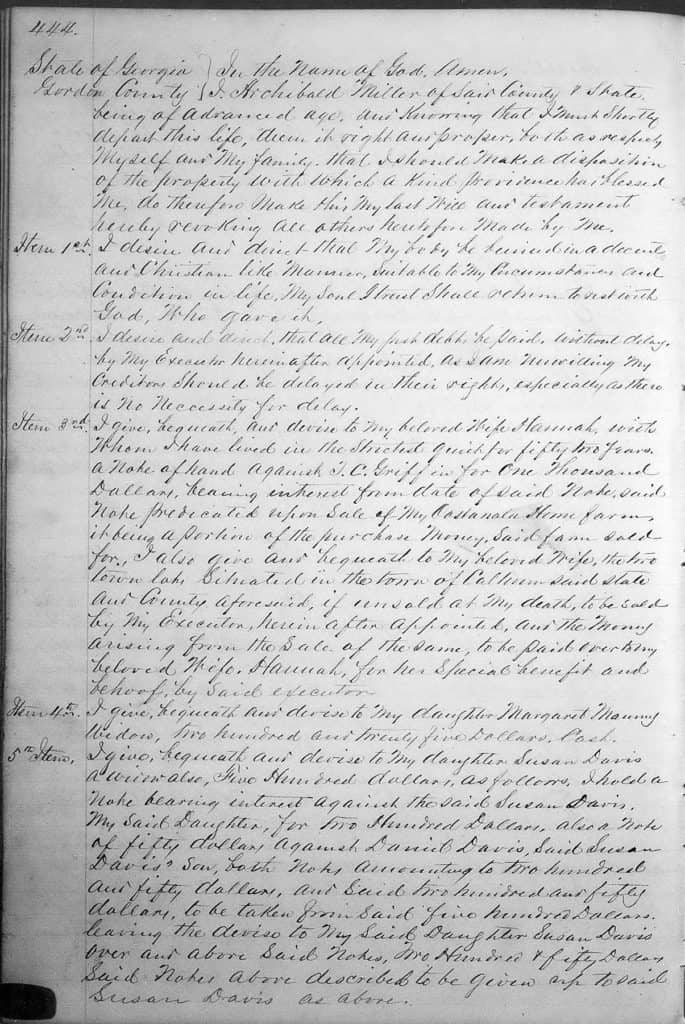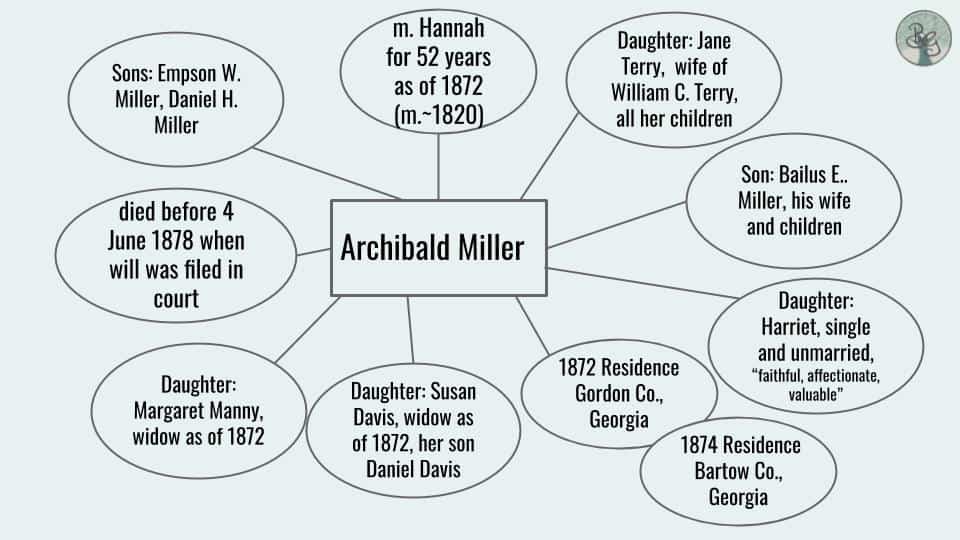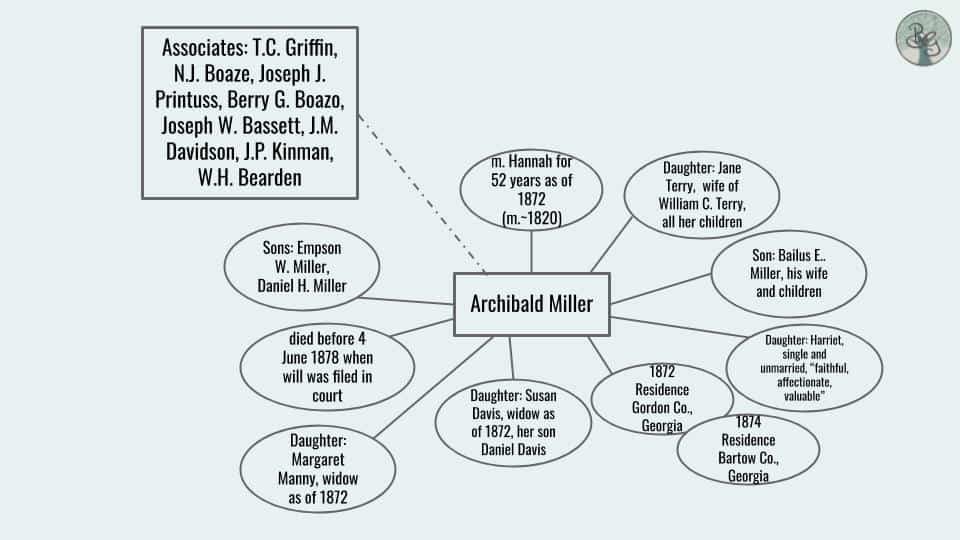
Did your ancestor leave a will before their death, choosing who would inherit their property? Have you taken a close look to find all the genealogy clues in that will? Let’s break it down line by line right now!
Watch This Episode, or Continue Reading Below
What is a last will & testament?
When one of our ancestors died, their property needed to be legally distributed to their heirs. A person could choose how their property would be disposed of, or passed on, after their death. To do this, they wrote a will, sometimes also called a last will and testament.
You can find digital wills on most major genealogy research sites. Although a small portion are searchable, you may have to go through a digital microfilm index to see if your ancestor is there.
Wills that have not yet been microfilmed or digitized can be found at courthouses, archives and libraries across the country.
Have you looked for a will for your ancestor?

Today’s example is from Georgia and a man named Archibald Miller, who died in 1878.
Boilerplate
Before we jump into the details of this will, let’s first talk about the general way a will was written.
During this time period in Georgia, and across much of the United States, the testator (or person writing the will) would write these items at the beginning of the will:
- state their name and their place of residence
- state the reason the will should be considered valid: they are of sound mind, they are writing of their own free will, etc.
- revoke any previous wills
- give instruction for the particulars of the disposal of their body, such as burial
- state that his or her debts should be paid first before heirs are given their portion
This section is pretty standard in most wills. It is often called BOILERPLATE meaning you will see this pattern commonly followed in this type of legal document. There are other portions of a will that would also be considered boilerplate which will be pointed out as we go through.
The Heirs
After the first section of “boilerplate”, the testator starts listing his heirs and the items he would like them to receive after his death. This is done item by item and lists both real and personal property.
In Archibald’s case, he begins listing his heirs after Item 2 as follows:
- Item 3: to his wife Hannah (real property), he also states that they have lived as man and wife for 52 years
- Item 4: to his daughter Margaret Manny, a widow
- Item 5: to his daughter Susan Davis, a widow, and her son Daniel Davis
- Item 6: to his son Empson W. Miller
- Item 7: to his daughter Jane Terry, wife of William C. Terry, and all her children
- Item 8: to his son Bailus E. Miller, his wife and children
- Item 9: to his daughter Harriet, single and unmarried
- Item 10: to his son Daniel H. Miller
- Item 11: to his wife Hannah (personal property)

This will gives us many clues about Archibald’s wife, children, spouses, residences, etc. The clue web above gives a visual representation of the information in the document.
More Boilerplate
After listing all his heirs, Archibald closes his will with typical boilerplate, which includes:
- Appointing an executor for his will. This is the person legally responsible to carry out the terms of the will after the testator dies. In this case, Archibald appoints his friend NJ Boaze as executor.
- Next, witnesses sign the will as more proof that this will was truly written by, and the wishes of the testator. Archibald has the typical three (3) witnesses: Joseph J. Printuss, Berry G. Boazo, Joseph W. Barrett.
- Lastly, he signed his will, in this case with an X mark on 27 April 1872 in Gordon County, Georgia.

Not only does this will give us many clues about Archibald’s family, but it also gives us information on several of his friends and associates. It is important to keep track of these associates as well. Often important information about our ancestors can come through the records of their associates.
What is a Codicil?
Now, this is already a long will, but then we get to a CODICIL, which is an addendum to the original will. A codicil does not revoke the old will. Instead, it allows the testator to change certain aspects of the will due to changes in property, or relationships, etc. over time.
Archibald wrote this will from Bartow County instead of Gordon County. His place of residence changed from the writing of the original will.
The codicil starts with some boilerplate stating his name, the date, and witnesses of the previous will that this codicil is altering
Then he states which Items he will alter: 7th, 9th, and 10th
After altering the property he gives to his children in those items, he also gives additional “debt relief” to his daughter Susan Davis for a $200 note he holds against her.
Archibald and three new witnesses sign this codicil 12 February 1874.
The will was filed in the ordinary court 4 June 1878. This gave an approximate death date for Archibald, as families generally tried to start the probate process soon after the decease of the family member.
The will was finally recorded in the court 19 February 1879.
Caution: Don’t Make These Assumptions
Keep in mind that even though this particular will lists many of Archibald’s children, it may not include all of them. The couple may have had children that died before this will was written, or that he chose to exclude from inheriting for his own reasons. However, the information it gives for the children he did list is rich with genealogy clues.
Also, keep in mind that the wife named in a will may or may not be the mother of the children listed. She may be a second or third wife of the man and may have given birth to some or none of his children. In our case, he states how long he and his wife have been faithfully married, so that helps us identify her as the mother of the children within that time period.
Go find a will!
A will can give us so many clues to help us expand our family tree! Clues about residence, wealth, family and friend relationships, etc. It can also help us pinpoint a death date for an ancestor in a place where vital records might not have been kept.
If you already have a will or two in your genealogy collection, I encourage you to pull it out again and have a second look to see what you might have missed the first time.
If you haven’t yet looked for a will for your ancestor, I highly recommend that you go looking for one!
What clues did you find about your ancestor in a will?
Pin for Later
Citation for this will:
Bartow County, Georgia, will of Archibald Miller, recorded 19 February 1879, p. 444-446. Court of Ordinary (Bartow County); imaged in “Georgia, Wills and Probate Records, 1742-1992,” Ancestry.com (https://www.ancestry.com/search/collections/usprobatega/ : accessed 16 January 2016) > Bartow > Wills, 1836-1922 > image 271 of 653.
Link to this exact record:
https://www.ancestry.com/interactive/8635/005764847_00271/61371

See you next time,
Melissa








